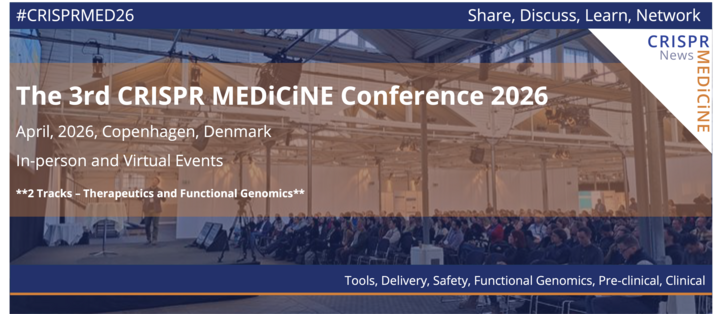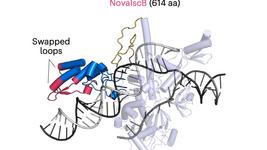CMN Weekly (3 February 2023) - Your Weekly CRISPR Medicine News
By: Karen O'Hanlon Cohrt - Feb. 3, 2023
Top pick
- CRISPR Therapeutics and Vertex Pharmaceuticals announced late last week that the European Medicines Agency and the Medicines and Healthcare products Regulatory Agency (UK) have validated the regulatory submissions of the companies' jointly-developed potential treatment for sickle cell disease and beta thalassemia, exa-cel.
Industry
- Korean biotech company GenKOre annouced last week that it has entered into a strategic research collaboration with an undisclosed US-based biopharmaceutical company for the development of in vivo gene-editing therapies across two disease targets. The partnership will allow GenKOre to further develop its hypercompact CRISPR-Cas tools, which are collectively dubbed TaRGET (tiny nuclease, augment RNA-based genome editing technology).
- Earlier this week, Allogene Therapeutics presented data on Dagger™, a next-generation AlloCAR T™ platform technology, at the Emerging Cellular Therapies at the Forefront of Cancer Immunotherapy Keystone Symposia in Banff, Alberta, Canada. The system is designed to resist AlloCAR T cell rejection by host immune cells, thus increasing the window of persistence during which AlloCAR T cells can expand and actively target and destroy cancer cells. Dagger is used in the development of Allogene’s anti-CD70 product candidate ALLO-316, which is being evaluated in TRAVERSE, a Phase 1 study of patients with relapsed or refractory renal cell carcinoma. For full details, see the company's press release here.
- Sherlock Biosciences has announced the acquisition of global molecular diagnostics company Sense Biodetection, with the goal to advancing CRISPR-based diagnostics for consumers. The move will add Sense’s Veros™ instrument-free rapid molecular test platform and manufacturing capabilities to Sherlock's highly developed CRISPR diagnostics, to advance highly accurate and affordable diagnostics that can be used anytime and anywhere.
Research
- In a manuscript shared on the pre-print server bioRxiv, a team of researchers in the U.S. present a base editing approach to treating the rare and devastating neuromuscular disease spinal muscular atrophy (SMA), which is caused by mutations in the SMN1 gene. The team tested a range of adenosine base editors (ABEs) and Cas9 enzymes, leading to an optimised approach that could precisely edit SMN2 , reverting the exon 7 mutation via an A•T-to-G•C base edit. They observed up to 99% intended editing in SMA patient-derived fibroblasts with concomitant increases in SMN2 exon 7 transcript expression and SMN protein levels. Delivery of their optimised ABEs via dual adeno-associated virus (AAV) vectors resulted in precise SMN2 editing in vivo in an SMA mouse model. Read the full study details here.
- This week, a team in Korea report the development of Campylobacter jejuni Cas9 (cjCas9)-based base editors including a cytosine base editor (cjCBEmax) and an adenine base editor (cjABE8e) that can successfully induce endogenous base substitutions by up to 91.2% at the HPD gene in human embroynic kidny (HEK) 293 cells. They found that the active windows of cjCBEmax and cjABE8e are wider than those of spCas9-based base editors and that their specificities are slightly lower than that of cjCas9. The findings were published in Experimental and Molecular Medicine.
- A team of researchers in Switzerland, Netherlands and the UK have used targeted pooled CRISPR-Cas9 screening and individual gene knockout validation experiments to uncover sorting nexin-9 (SNX9) as a mediator of T cell exhaustion. They observed that upon TCR/CD28 stimulation, deletion of SNX9 in CD8 T cells decreases PLCγ1, Ca2+, and NFATc2-mediated T cell signalling and reduces the expression of NR4A1/3 and TOX, which plays pro-ongogenic roles in cancer, and which contributes to T cell exhaustion, respectively. The authors propose that their findings highlight SNX9 tareting a strategy to prevent T cell exhaustion and enhance anti-tumour immunity. The findings were published yesterday in Nature Communications.
Reviews
- Innovations in CRISPR-Based Therapies. This mini-review assesses the status of CRISPR-based in vivo and ex vivo therapies, and the challenges associated with clinical translation. The safety, affordability, and feasibility of CRISPR therapies, especially for treating large number of patients, are also discussed.
- CRISPR/Cas9 in the era of nanomedicine and synthetic biology. In this review, researchers in Italy introduce the concept of nanogenetics and speculate how rational engineering of CRISPR-Cas machinery could advance the biomedical field.
- CRISPR Off-Target Analysis Platforms. This review provides a description of currently available CRISPR technologies, CRISPR applications, and current analysis platforms to detect off-target effects. Methods discussed include genome-wide, unbiased identification of double-stranded breaks enabled by sequencing (GUIDE-Seq), high-throughput genomic translocation sequencing (HTGTS), breaks labelling, enrichments on streptavidin and next-generation sequencing (BLESS), and in vitro nuclease-digested genome sequencing (Digenome-seq).
- RNA in Therapeutics: CRISPR in the Clinic. This review describes some of the recent advances in the therapeutic application of gene-editing technologies.
- Intravaginal delivery for CRISPR-Cas9 technology: for example, the treatment of HPV infection.This review describes various nano-carriers and their prospects in the pre-clinical stage, as well as the future significance of CRISPR-Cas9 vaginal delivery based on nano-carriers.
Conferences
- CRISPR - Genome editing in Medicine and Agriculture. This one-day symposium, to be held on 16th April 2023 at The David Lopatie Conference Centre, Weizmann Institute of Science, Israel, will include presentations covering advances in genome-editing technologies as well as applications in medicine and agriculture. For more details and registration see here and here, respectively.
- CRISPR CONFERENCE 2023. This event, to be held from 27th June to 1st July 2023 in Würzburg, Germany, will bring together internatioal experts to discuss broad aspects of CRISPR biology ranging from genetics, biochemistry, structural biology, ecology, evolution and applications. See more details here.
- Third International Summit on Human Genome Editing. This free event will take place from 6th to 8th March 2023 at the Francis Crick Institute, London UK. The three-day event will continue the global dialogue on somatic and germline human genome editing. Major themes for discussion include developments in clinical trials and genome editing tools such as CRISPR/Cas9, as well as social, ethical and accessibility considerations these scientific developments entail.
Huh, heh, wow
Earlier this week, the world’s first de-extinction company Colossal Biosciences announced that it had secured $150M in Series B funding and unveiled plans to resurrect the iconic dodo. Colossal launched in 2021, and since then it has raised $225M in total funding. The company plans to leverage the latest funding boost to further advance genetic engineering and pioneer new revolutionary software, wetware and hardware solutions, all of which have applications to de-extinction, conservation and human healthcare. Read more in the company's press release here.
News from CRISPR Medicine News
- Last week, Allogene Therapeutics announced the publication of data from the Phase 1 UNIVERSAL trial of ALLO-715, a TALEN-engineered CAR-T candidate designed to treat multiple myeloma. The results suggest that ALLO-715 treatment in combination with anti-CD52-based lymphodepletion shows promise as an off-the-shelf treatment option for patients with relapsed or refractory disease. Read more in this week's clinical trial update here.
To get more of the CRISPR Medicine News delivered to your inbox, sign up to the free weekly CMN Newsletter here.
Tags
CLINICAL TRIALS
Castration-Resistant Prostate Cancer, CRPC, and Salivary Gland Cancer, SGC, (NCT04249947)
Sponsors:
Poseida Therapeutics, Inc.
Sponsors:
Poseida Therapeutics, Inc.
IND Enabling
Phase I
Phase II
Phase III
IND Enabling
Phase I
Phase II
Phase III
IND Enabling
Phase I
Phase II
Phase III







